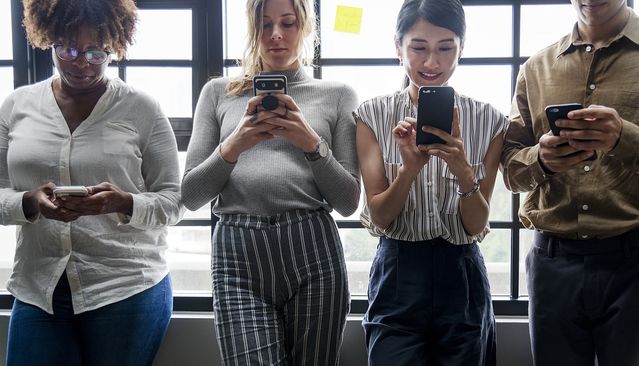We are plagued by a loneliness epidemic. In the last fifty years, regardless of geographic location, gender, race, or ethnicity, rates of loneliness have doubled in the United States. This increase has been associated with several growing concerns related to mental and physical well-being. Yet, in a time in which it seems that we are more connected than ever before, how could this be possible? Could it be that our technological advances developed to foster connectivity are also affecting our loneliness?

In a survey exploring social media patterns, it was found that individuals who spent more time on social media every day felt lonelier than those who spent less time engaged in social media. Additionally, those who spent more time on social media in a given week felt more isolated than those who checked their social media less. An increase in social media use has been associated with increased distractibility and sleep disturbances. Researchers at Vrije Universiteit Amsterdam and Radboud University Nijmegen have highlighted that we experience a pleasure response to social media sites such as Facebook. Similarly, Erik Peper, Associate Professor of Health Education at San Francisco State University, emphasizes that smartphone use can form neurological connections similar to connections that are seen in individuals with an opioid addiction. Further, in a study of 135 individuals, Peper and his colleagues found that people who utilize their phones more often were more likely to report feeling anxious, depressed, isolated, and lonely.
Is there a relationship between social media and loneliness?
In order to better understand how social media may be connected to loneliness, we must first recognize that it is not a simple equation. Just as there are a variety of reasons in which one may use social media, there are different ways in which social media could be fostering loneliness. The ease of accessibility may be causing us to connect more in the digital realm, but disconnect from the world around us. Researchers at the University of British Columbia found that even seemingly mild distractions from a buzzing phone could cause individuals to experience a decrease of present enjoyment. For example, if you’re at a social gathering and impulsively grab your phone as you feel the notification vibration, even if you do not continue to open the app, this brief moment could cause a feeling of disconnection with others present at the gathering.
The Center for Humane Technology highlights that we may experience a fear of missing out that causes us to compulsively check for updates. The persistent need to log-in can inhibit users’ ability to relax and replenish. Lack of adequate rest could cause individuals to become susceptible to mental health risks. Individuals may become glued to their devices to avoid feeling unaware of current events and feel disconnected from others. It is also possible to encounter unwanted updates that prompt feelings of isolation. For example, if someone finds a picture of their loved ones gathered for an event to which he or she did not receive an invitation, seeing this update could trigger the individual to feel excluded.
Exposure to idealized images on social media can also elicit envy. Falling prey to social comparison, individuals who were otherwise content could develop a sense of dissatisfaction by labeling themselves as less successful, happy, or adventurous. In a study of individuals who utilize Twitter and Facebook, participants who admitted to going out of their way to seek validation (e.g., likes) and to portray a perfect profile were more likely to suffer from low self-esteem and be less trusting of others. If an individual is focused on minimizing their flaws and concerns, they may lack the ability to relate to others about actual life experiences. Also, their own knowledge of their altered reality could cause someone to feel fraudulent and disconnected. Finally, their obviously skewed profile could cause others to feel a lack of connection as well.
Cyberbullying, including threatening messages, sharing private or humiliating information, or social exclusion, is a common cause for developing loneliness. However, due to the aggression occurring online rather than in-person, we may tend to underestimate the negative influence of cyberbullying. In a study of teens utilizing social media, spending more than two hours a day on social media made participants more likely to report cyberbullying. Similarly, in a nationally representative sample of 5,600 youth between the ages of 12 and 17, 34 percent admitted to being cyberbullied, and 17 percent clarified that it had occurred within the last month. Of those who had been bullied, 64 percent shared that it affected their ability to learn and feel safe at school. 12 percent of the students admitted to cyberbullying another person. Finally, cyberbullying is not always interpersonal. Digital self-harm, or self-trolling, in which an individual shares mean things anonymously about themselves online, is gaining attention. While the research is still new in this area, it is worthwhile to consider that some individuals who engage in this self-inflicted digital pain may use it as a desperate attempt to connect with others who will join in on the bullying process.
So, is it all negative?
There are certainly benefits to social media. For one, it does succeed in promoting the ease and accessibility of shared information. Social networking has been shown to assist introverted adolescents in developing socialization skills. Also, in a study of over 30,000 youth across the globe, it was found that students who utilize social media to communicate about school tend to earn higher grades. Social media allows for increased availability of resources for individuals who otherwise may not have had access. For example, social media connectivity can help an individual suffering from depression find resources and support to promote healing. Further, connection with the screen as a barrier can help individuals feel safer. For example, an individual may find it easier to get to know a potential partner through social media profiles rather than giving their phone number, address, or even meeting in person. Social media proves us with a new way to engaged, bond, and interact. Such platforms may provide the potential to fulfill our needs for connection and belonging.
Unlike other studies discussed earlier, according to the Cigna Loneliness Index, social media use was not found to be a predictor of loneliness. Additionally, Researchers at the University of Missouri and the University of Kansas found that social media use has no significant negative effect on social interactions or social well-being. Therefore, it may be important to consider quality versus quantity. Social media may be less about how oftenit is utilized, and more about the ways in which it is used.
A Flemish longitudinal study of adolescents using Instagram found that using the platform was related to feeling close and appreciated. After six months, Instagram use was related to reduced symptoms of depression. In a similar study conducted by Mai-Ly Steers at the University of Houston, Facebook was highlighted as an effective tool for connecting with friendsand creating new friendships. However, over time, individuals begin to compare themselves to others, and this comparison was related to symptoms of depression. While the difference between these studies beyond the sample could be the applications themselves, in regards to loneliness, it could also be related to the user’s perception of connection versus comparison. Further, while some individuals’ comparisons may cause envy and depression others are able to utilize their self-awareness and self-assurance to transcend comparisons, maintain connections, and combat risks of loneliness.
Okay, so there’s good and bad. Now what?
Individuals who are lonely may turn to the digital realm to quell their feelings of isolation. Hence, this longing could cause someone who is lonely to be more likely to develop a need to be more connected to his or her device. On the other hand, it is possible that individuals who are not experiencing loneliness may develop a sense of isolation due to the quantity and quality of their social media experiences. A relationship does not always highlight a cause. When relationships between social media and loneliness are noted in the literature, we may jump to label social media as the culprit. However, it is important to recognize that for many, social media can be a powerful catalyst in combating loneliness. For those who may experience loneliness due to social media, other factors such as self-esteem, trust, and sadness may be important underlying factors that warrant consideration.


